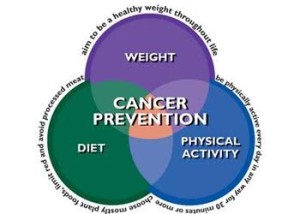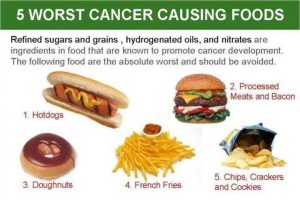Health Awareness Month continues with Cancer Awareness. Last week’s focus was on exercise as a means of prevention (studies show 30 minutes of brisk walking each day helps to reduce the risk of cancer), as well as the importance of fitness during and after cancer treatment. This week we will focus on the link between diet and cancer.
According to the National Cancer Institute, as much as 80 percent of all cancers are due to identified factors, and thus are potentially preventable. Thirty percent are due to tobacco use, and as much as 35 to 50 percent are due to the type and amount of food we eat. No single food can prevent cancer, but the right combination of foods may help make a difference. At mealtimes, strike a balance of at least two-thirds plant-based foods and no more than one-third animal protein.
This means plenty of fruits and vegetables. Base your diet on fruits, vegetables and other foods from plant sources — such as whole grains and beans. Studies have also shown that fiber protects against colon, stomach and breast cancer. Experts recommend 30-40 grams per day. Foods that are closest to their natural state, unrefined and unpeeled, are highest in fiber. Limit fat. Eat lighter and leaner by choosing fewer high-fat foods, particularly those from animal sources as there is evidence that animal fat is much more harmful than vegetable fat. One study noted a 200 percent increase in breast cancer among those who consume beef or pork five to six times per week. High-fat diets tend to be higher in calories and might increase the risk of overweight or obesity — which can, in turn, increase cancer risk.
If you choose to drink alcohol, do so only in moderation. The risk of various types of cancer —including cancer of the breast, colon, lung, kidney and liver — increases with the amount of alcohol you drink and the length of time you’ve been drinking regularly. Start with gradual changes to your diet, increasing vegetables, decrease red meats, add morebeans and whole grains, decrease sugar and fats, eliminate processed foods and drink more water. You’ll feel better, have more energy and decrease your risk of cancer.




